萧伯纳经典戏剧Pygmalion《卖花女》(课堂PPT)
萧伯纳ppt
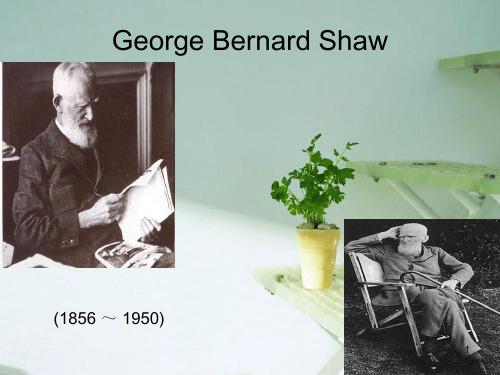
His works
《鳏夫的房产》 Mrs. Warren‘s Profession 《华伦夫人的职业》 《凯萨与克丽奥佩拉 》
Man and Superman (1903) Widowers' Houses (1892)
Major Barbara (1905)
《巴巴拉少校》
Pygmalion (1912)
.
贞德在审判中被监禁在圣女贞德塔
• .
Pygmalion [piɡ'meiljən ](1912)
《卖花女》
窈窕淑女 (My Fair Lady) 1964年改编成电影《窈窕
淑女》,当年获奥斯卡最佳 影片、最佳导演、最佳改编 音乐等八座小金人。)
Mrs. Warren’s Profession
Shaw—Dramatist of Ideas:
III.His purpose of writing these plays of “ideas” is to draw people’s attention to the social problems. Shaw—“Drama is no mere setting up of the camera to nature; it is the presentation of problem.” Shaw called his first plays “unpleasant”, because “their dramatic power is used to force the spectator to face unpleasant fact.” As a dramatic critic and a student of Ibsen, he knew how to achieve theatrical effect …. but he was careful (unlike Ibsen) not to scandalize them beyond their willingness to listen.
萧伯纳经典戏剧ygmalion卖花女课件
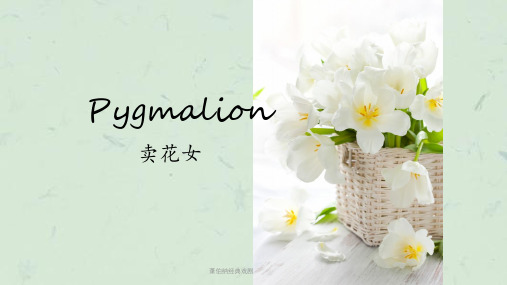
皮克林上校
Colonel Pickering, a
linguist who has traveled to London from India to see Higgins. An elderly, amiable soldier, Pickering is as confirmed a bachelor as Higgins, but he is a gentleman who treats Eliza with respect and helps to moderate Higgins’ mistreatment of her.
萧伯纳经典戏剧ygmalion卖花女
伊莉莎.杜利托
Eliza Doolittle, the flower girl. Dirty and
ignorant, Eliza comes to Higgins and pathetically begs him to teach her to speak well enough to run a respectable flower shop.
萧伯纳经典戏剧ygmalion卖花女
阿尔弗雷德.杜利托
Alfred Doolittle, a dustman, Eliza’s
father. Doolittle is distinguished by a good voice, an original mind, and a complete absence of conscience. He plans to blackmail Higgins, mistakenly thinking that Higgins has taken Eliza as his mistress. Higgins and Pickering are so delighted by the scoundrel’s straightforwardness that they give him five pounds. Doolittle is made middle class by Higgin's letter to Ezra D. Wannafeller, an American philanthropist, Higgins calls Doolittle “the most original moralist” in England. Wannafeller leaves Doolittle an income of 3 thousand pounds a year.
萧伯纳作品赏析Pygmalionppt课件
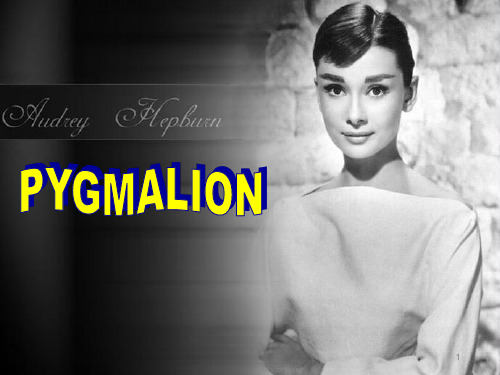
rights, and advocate of equality of income.
5
Born in Dublin in 1856 to a middle-class Protestant family.
He married Charlotte Payne-Townshend in 1898, but it is known that he never touched her once.
With wondrous art, he creates a beautiful statue in ivory, Galatea, representing feminine ideal.
12
13
When Pygmalion returns home, he kisses his statue and is delighted to find that she is warm and soft to touch.
“The maiden felt the kisses, blushed and lifting her timid eyes up to the light, saw the sky and her lover at
6
Literary Career and Achievements
the second greatest English playwright behind only Shakespeare
“a day never passes without a performance of some Shaw play being given somewhere in the world.”
萧伯纳中英介绍精品PPT课件

He opposes to Oscar Wilde’s “Art for art’s sake”, advocating literary works should reflect the
social reality.
Shaw and Luxun(鲁迅), and Songqingling宋庆龄
Saint Joan is the only
tragedy of his works
The decade of 20th century before WWI is a period of high productivity for Shaw
LOGO
Pygmalion
—— My Fair Lady
June,15th,2015
By No
(1856 ~ 1950)
4
• One day ,Shaw took part in a
grand party, in which he met a
very fat businessman. While • 有一次宴会前的演讲中,当
Shaw was very thin at that time. 轮到长得很瘦的萧伯纳发
爱尔兰剧作家,文学评论家,社会 主义的宣传者,1925年因作品具有 “理想主义”和“人道主义”获 诺贝尔文学奖。
His family belonged to the Irish protestant gentry. His father was an unsuccessful businessman; his mother was a musician of talent. Apart from the musical education he received from his mother, he was practically self-educated.
《萧伯纳和小姑娘》PPT课件
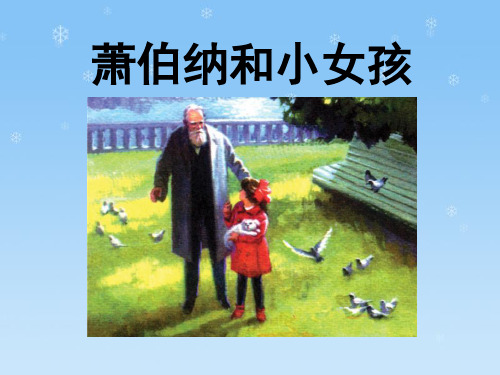
“别忘了回去告诉你妈妈,就说今天同你
.... 玩的是世界闻名的萧伯纳!” “先生,您就是萧伯纳?” “怎么,难道我不像吗?” “可是,您怎么会说自己了不起呢?请回 去也告诉您的妈妈,就说今天同您玩的是一个 普普通通的小姑娘!”
临别的时候,萧伯纳把头一扬,幽默地对 小姑娘说:“别忘了回去告诉你妈妈,就说今 天同你玩的是世界闻名的萧伯纳!”
PPT素材:/sucai/ PPT图表:/tubiao/ PPT教程: /powerpoint/ 范文下载:/fanwen/ 教案下载:/jiaoan/ PPT课件:/kejian/ 数学课件:/kejian/shu xue/ 美术课件:/kejian/me ishu/ 物理课件:/kejian/wul i/ 生物课件:/kejian/she ngwu/ 历史课件:/kejian/lish i/
萧伯纳和小女孩
萧伯纳
PPT模板:/moban/ PPT背景:/beijing/ PPT下载:/xiazai/ 资料下载:/ziliao/ 试卷下载:/shiti/ PPT论坛: 语文课件:/kejian/yuw en/ 英语课件:/kejian/ying yu/ 科学课件:/kejian/kexu e/ 化学课件:/kejian/huaxue/ 地理课件:/kejian/dili/
萧伯纳愣住了,他觉得刚才自己太自以为 是了,一时不知说什么才好。
后他来想,:萧伯纳常对人说:“一个人无论。取 得多大的成就,都不能骄傲,要永远谦虚。 这就是那位小姑娘给我的启迪。”
萧伯纳愣住了,他觉得刚才自己太自以为 是了,一时不知说什么才好。
后来,萧伯纳常对人说:“一个人无论取 得多大的成就,都不能骄傲,要永远谦虚。 这就是那位小姑娘给我的启迪。”
萧伯纳PPT

5
ห้องสมุดไป่ตู้
The Nobel Prize
Saint Joan
Saint Joan is a play by George Bernard Shaw, based on the life Shaw and trial of Joan of Arc. to Shaw studied the is the only person have been 1924 transcripts and decided that the concerned people acted awarded both a Nobel Prize in Literature in good (1925) faith according to theirAward beliefs. He wrote and an Academy (1938), for in his prefacehis to contributions the play: to literature and for his work on the film Pygmalion. There are no villains in the piece. Crime, like disease, is not interesting: it is something to be done away with by generalShaw consent, anddown that is [there is] about turned allall other awards and it. It is what men do at including their best, with good intentions, and what honors, the offer of a knighthood. normal men and women find that they must and will do in spite of their intentions, that really concern us.
pygmanlion卖花女
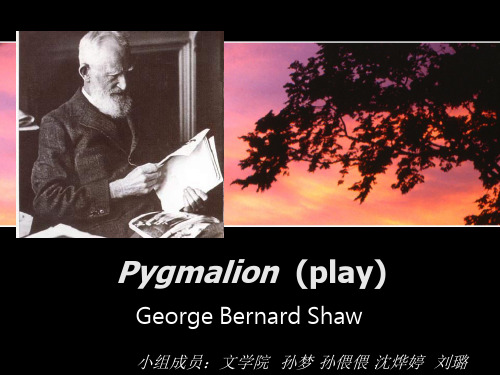
Pygmalion
My Fair Lady
Different ending
At the end of the play,Eliza and Higgins did not become lovers. But in the film version of "Pygmalion" , finally Eliza went back to Higgins, and Higgins said : "Eliza, where the devil are my slippers? "Then the musical" my fair lady "have followed the ending.
Pygmalion (play)
George Bernard Shaw
X小组成员:文学院 孙梦 孙偎偎 沈烨婷 刘璐
Introduction
• Pygmalion ---Greek myth The title of the play is taken from Greek mythol ogy.Pygmalion,King of Cyprus,was a famous scul ptor.He made a beautiful ivory statue of a wom an,which he named Galatea,and fell in love with i t.At his prayer Aphrodite,the goddess of bea uty and love,gave it life.And Galatea,now a wo man in flesh and blood,became Pygmalion ’s wife.
《卖花女》剧本全本 1st

Pygmalion 之老阳三干创作Act 1Covent Garden at 11.15 p.m. Torrents of heavy summer rain. Cab whistles blowing frantically in all directions. Pedestrians running for shelter into the market and under the of St. Paul's Church, where there are already several people. They are all peering out gloomily at the rain, except one man with his back turned to the rest, who seems wholly preoccupied with a notebook in which heis writing busily. The church clock strikes the first quarter.A young man of twenty, in evening dress, opens his umbrella and dashes off onto the street to stop a passing taxi, but comes into collision with a flower girl, who is hurrying in for shelter, knocking her basket out of her hands. A blinding flash of lightning, followed instantly by a rattling peal of thunder, orchestrates the incident.] THE FLOWER GIRL:Nah then, look wh' y' gowin, deah.The YOUNG MAN:Sorry [he rushes off].THE FLOWER GIRL:[picking up her scattered flowers and replacing themin the basket] There's menners f' yer! Te-oo banches o voylets trod into the mad. [She sits down onthe of the column, sorting her flowers, on theright of an old lady. She is not at all anattractive person. She is perhaps eighteen, perhapstwenty, hardly older. She wears a little sailor hat of black straw that has long been exposed to thedust and soot of London and has seldom if ever beenbrushed. Her hair needs washing rather badly: itsmousy color can hardly be natural. She wears a shoddy black coat that reaches nearly to her knees and is shaped to her waist. She has a brown skirt with a coarse apron. Her boots are much the worse for wear. She is no doubt as clean as she can afford to be; but compared to the ladies she is very dirty.Her features are no worse than theirs; but their condition leaves something to be desired; and she needs the services of a dentist].[An elderly gentleman of the amiable military type rushes into shelter, and closes a dripping umbrella. He is in the same plight as Freddy, very wet about the ankles. He is in evening dress, with a light overcoat. He takes the place left vacant by the daughter's retirement.]THE GENTLEMAN:Phew!The OLD LADY:[to the gentleman]Oh, sir, is there any sign ofits stopping?THE GENTLEMAN:I'm afraid not. It started worse than ever about two minutes ago. [He goes to the plinth beside theflower girl; puts up his foot on it; and stoops toturn down his trouser ends].THE OLD LADY:Oh, dear! [She retires sadly].THE FLOWER GIRL:[taking advantage of the military gentleman'sproximity to establish friendly relations withhim].If it's worse it's a sign it's nearly over.So cheer up, Captain; and buy a flower off a poorgirl.THE GENTLEMAN:I'm sorry, I haven't any change.THE FLOWER GIRL:I can give you change, Captain,THE GENTLEMAN:For a sovereign? I've nothing less.THE FLOWER GIRL:Garn! Oh do buy a flower off me, Captain. I canchange half-a-crown. Take this for tuppence.THE GENTLEMAN:Now don't be troublesome: there's a goodgirl. [Trying his pockets]I really haven't anychange—Stop: here's three hapence, if that's anyuse to you [he retreats to the other pillar].THE FLOWER GIRL:[disappointed, but thinking three halfpence betterthan nothing]Thank you, sir.THE BYSTANDER A [a vigilant, eccentric middle-aged man in a long raining jacket]:[to the girl]You be careful: give him a flower for it. There's a man here behind taking down every word you're saying. [All turn to the man who is takingnotes].THE FLOWER GIRL:[springing up terrified]I ain't done nothing wrong by speaking to the gentleman. I've a right to sell flowers if I keep off the kerb. [Hysterically]I'm a respectable girl: so help me, I never spoke to him except to ask him to buy a flower off me. [General hubbub, mostly sympathetic to the flower girl, but deprecating her excessive sensibility. Cries of Don't start hollerin. Who's hurting you?Nobody's going to touch you. What's the good of fussing? Steady on. Easy, easy, etc., come from the elderly staid spectators, who pat her comfortingly.Less patient ones bid her shut her head, or ask her roughly what is wrong with her. A remoter group, not knowing what the matter is, crowd in and increase the noise with question and answer: What's the row?What she do? Where is he? A tec taking her down.What! him? Yes: him over there: Took money off the gentleman, etc. The flower girl, distraught andmobbed, breaks through them to the gentleman, cryingmildly]Oh, sir, don't let him charge me. You dunnowhat it means to me. They'll take away my characterand drive me on the streets for speaking togentlemen. They—THE NOTE TAKER:[coming forward on her right, the rest crowdingafter him]There, there, there, there! Who'shurting you, you silly girl? What do you take me for? THE FLOWER GIRL:[still hysterical]I take my Bible oath I neversaid a word—THE NOTE TAKER:[overbearing but good-humored]Oh, shut up, shut up.Do I look like a policeman?THE FLOWER GIRL:[far from reassured]Then what did you take down mywords for? How do I know whether you took me downright? You just show me what you've wrote aboutme. [The note taker opens his book and holds itsteadily under her nose, though the pressure of themob trying to read it over his shoulders would upseta weaker man].What's that? That ain't properwriting. I can't read that.THE NOTE TAKER:I can. [Reads, reproducing her pronunciationexactly]“Cheer ap, Keptin; n' haw ya flahr orf apore gel.”THE FLOWER GIRL:[much distressed]It's because I called him Captain.I meant no harm.[To the gentleman]Oh, sir, don'tlet him lay a charge agen me for a word like that.You—THE GENTLEMAN:Charge! I make no charge. [To the notetaker]Really, sir, if you are a detective, youneed not begin protecting me until I ask you.Anybody could see that the girl meant no harm.THE BYSTANDERS GENERALLY:[demonstrating against police espionage]Coursethey could. What business is it of yours? You mindyour own affairs. Girl never said a word to him.What harm if she did? Nice thing a girl can'tshelter from the rain without being insulted, etc.,etc., etc. [She is conducted by the moresympathetic demonstrators back to her plinth, whereshe resumes her seat and struggles with her emotion]. THE BYSTANDER B:He ain't a tec. He's a blooming busybody: that'swhat he is. I tell you, look at his boots.THE NOTE TAKER:[turning on him ]And how are all your people down at Selsey?THE BYSTANDER B:[suspiciously]Who told you my people come fromSelsey?THE NOTE TAKER:Never you mind. They did. [To the girl]How do you come to be up so far east? You were born in LissonGrove.THE FLOWER GIRL:[appalled]Oh, what harm is there in my leavingLisson Grove? It wasn't fit for a pig to live in;and I had to pay four-and-six a week. [Intears]Oh, boo—hoo—oo—THE NOTE TAKER:Live where you like; but stop that noise.THE GENTLEMAN:[to the girl]Come, come! he can't touch you: youhave a right to live where you please.THE FLOWER GIRL:[subsiding into a brooding melancholy over herbasket, and talking very low-spiritedly toherself]I'm a good girl, I am.THE BYSTANDER B:[not attending to her]Do you know where thisgentleman comes from?THE NOTE TAKER:Cheltenham, Harrow, Cambridge, and India.[Titterings. Popular interest in the note taker's performance increases.]THE GENTLEMAN:Quite right. [Great laughter. Reaction in the notetaker's favor. Exclamations of He knows all aboutit. Told him proper. Hear him tell the where hecome from? etc.].May I ask, sir, do you do thisfor your living at a music hall?THE NOTE TAKER:I've thought of that. Perhaps I shall some day. [The rain has stopped; and the persons on the outside of the crowd begin to drop off.]THE FLOWER GIRL:[resenting the reaction]He's no gentleman, he ain't, to interfere with a poor girl.[still preoccupied with her wounded feelings]He's no right to take away my character. My character is the same to me as any lady's. THE NOTE TAKER:I don't know whether you've noticed it; but the rainstopped about two minutes ago.THE BYSTANDER B:So it has. Why didn't you say so before? and uslosing our time listening to your silliness. [Hewalks off. With some grumbles, other bystanders also walk off the stage separately].THE FLOWER GIRL:Poor girl! Hard enough for her to live without being worrited and chivied.THE GENTLEMAN:[returning to his former place on the note taker'sleft]How do you do it, if I may ask?THE NOTE TAKER:Simply phonetics. The science of speech. That's myprofession; also my hobby. Happy is the man who canmake a living by his hobby! I can place any manwithin six miles. I can place him within two milesin London. Sometimes within two streets.THE FLOWER GIRL:Ought to be ashamed of himself, unmanly coward!THE GENTLEMAN:But is there a living in that?THE NOTE TAKER:Oh yes. Quite a fat one. This is an age of upstarts.Men begin in Kentish Town with 80 pounds a year, andend in Park Lane with a hundred thousand. They wantto drop Kentish Town; but they give themselves awayevery time they open their mouths. Now I can teachthem—THE FLOWER GIRL:Let him mind his own business and leave a poorgirl—THE NOTE TAKER:[explosively]Woman: cease this horrible boohooinginstantly; or else seek the shelter of some otherplace.THE FLOWER GIRL:[with feeble defiance]I've a right to be here if Ilike, same as you.THE NOTE TAKER:A woman who utters such depressing and disgustingsounds has no right to be anywhere—no right to live.Remember that you are a human being with a soul andthe divine gift of articulate speech: that yournative language is the language of Shakespear andMilton and The Bible; and don't sit there like apigeon.THE FLOWER GIRL:[quite overwhelmed, and looking up at him in mingled wonder and deprecation without daring to raise herhead]Ah—ah— ah—ow—ow—oo!THE NOTE TAKER:[whipping out his book]Heavens! what a sound! [He writes; then holds out the book and reads,reproducing her vowels exactly]Ah—ah—ah—ow—ow—ow—oo!THE FLOWER GIRL:[tickled by the performance, and laughing in spiteof herself]Garn!THE NOTE TAKER:You see this creature with her gutter English: theEnglish that will keep her in the gutter to the endof her days. Well, sir, in three months I could pass that girl off as a duchess at an ambassador's garden party. I could even get her a place as lady's maidor shop assistant, which requires better English.[The flower girl listens attentively and was shocked by his remarks. She repeats with noticeablecuriosity, “duchess”? “lady’s maid”? “shopassistant”? ]THE GENTLEMAN:I am myself a student of Indian dialects; and—THE NOTE TAKER:[eagerly]Are you? Do you know Colonel Pickering,the author of Spoken Indian Dialects?THE GENTLEMAN:I am Colonel Pickering. Who are you?THE NOTE TAKER:Henry Higgins, author of Higgins's UniversalAlphabet.PICKERING:[with enthusiasm]I came from India to meet you. HIGGINS:I was going to India to meet you.PICKERING:Where do you live?HIGGINS:27A Wimpole Street. Come and see me tomorrow. PICKERING:I'm at the Carlton Hotel. Come with me now andlet's have a talk over some supper.HIGGINS:Right you are.THE FLOWER GIRL:[to Pickering, as he passes her]Buy a flower, kind gentleman.PICKERING:I really haven't any change. I'm sorry [he goesaway].HIGGINS:[shocked at girl's ]Liar. You said you couldchange half-a-crown.THE FLOWER GIRL:[rising in desperation]You ought to be stuffedwith nails, you ought.[Flinging the basket at hisfeet]Take the whole blooming basket for sixpence. [The church clock strikes the second quarter.]HIGGINS:[hearing in it the voice of God, him forhis to the poor girl] A reminder. [He raiseshis hat solemnly; then throws a handful of moneyinto the basket and follows Pickering].THE FLOWER GIRL:[picking up a half-crown]Ah—ow—ooh! [Picking upa couple of florins]Aaah—ow—ooh! [Picking upseveral coins]Aaaaaah—ow—ooh![Picking upa ]Aaaaaaaaaaaah—ow—ooh!!![With ecstasy, theFlower Girl runs off the stage. End of Act 1 ]Act 2[Next day at 11 a.m. Higgins's laboratory in Wimpole Street. The middle of the room is clear. Besides the easy chair, the piano bench, and two chairs at the phonograph table, there is one stray chair. It stands near the fiWordStr. Pickering is seated at the table, putting down some cards and a tuning-fork which he has been using. Higgins is standing up near him, closing two or three file drawers that are hanging out. He appears in the morning light as a robust, vital, appetizing sort of man of forty or thereabouts, dressed in a professional-looking black frock-coat with a white linen collar and black silk tie. He is of the energetic, scientific type, heartily, even violently interested in everything that can be studied as a scientific subject, and careless about himself and other people, including their feelings. He is, in fact, but for his years and size, rather like a very impetuous baby “taking notice” eagerly and loudly, and requiring almost as much watching to keep him out of unintended mischief. His manner varies from genial bullying when he is in a good humor to stormy petulance when anything goes wrong; but he is so entirely frank and void of malice that he remains likeable even in his least reasonable moments.] HIGGINS:[as he shuts the last drawer]Well, I think that'sthe whole show.PICKERING:It's really amazing. I haven't taken half of it in,you know.HIGGINS:Would you like to go over any of it again? PICKERING:[rising and coming to the fiWordStr, where he plants himself with his back to the fire]No, thank you;not now. I'm quite done up for this morning.HIGGINS:[Mrs. Pearce looks in: she is Higgins'shousekeeper]What's the matter?MRS. PEARCE:[hesitating, evidently perplexed] A young womanwants to see you, sir.HIGGINS:A young woman! What does she want?MRS. PEARCE:Well, sir, she says you'll be glad to see her whenyou know what she's come about. She's quite a common girl, sir. Very common indeed. I should have senther away, only I thought perhaps you wanted her totalk into your machines. I hope I've not done wrong;but really you see such queer people sometimes—you'll excuse me, I'm sure, sir—HIGGINS:Oh, that's all right, Mrs. Pearce. Has she aninteresting accent?MRS. PEARCE:Oh, something dreadful, sir, really. I don't knowhow you can take an interest in it.HIGGINS:[to Pickering]Let's have her up. Show her up, Mrs.Pearce [he rushes across to his working table andpicks out a cylinder to use on the].MRS. PEARCE:[only half resigned to it]Very well, sir. It's for you to say. [She goes downstairs].HIGGINS:This is rather a bit of luck. I'll show you how Imake records. We'll set her talking; and I'll takeit down --MRS. PEARCE:[returning]This is the young woman, sir.[The flower girl enters in state. She has a hat with three ostrich feathers, orange, sky-blue, and red. Shehas a nearly clean apron, and the shoddy coat has been tidied a little. The of this figure, with its innocent vanity and consequential air, touches Pickering, who has already straightened himself in the presence of Mrs. Pearce. But as to Higgins, the only distinction he makes between men and women is that when he is neither bullying nor exclaiming to the heavens against some featherweight cross, he coaxes women as a child coaxes its nurse when it wants to get anything out of her.] HIGGINS:[brusquely, recognizing her with unconcealeddisappointment, and at once, babylike, making anintolerable grievance of it]Why, this is the girlI jotted down last night. She's no use: I've got allthe records I want of the Lisson Grove lingo; andI'm not going to waste another cylinder on it.[Tothe girl]Be off with you: I don't want you.THE FLOWER GIRL:Don't you be so saucy. You ain't heard what I comefor yet. [To Mrs. Pearce, who is waiting at thedoor for further instruction]Did you tell him Icome in a taxi?MRS. PEARCE:Nonsense, girl! what do you think a gentleman likeMr. Higgins cares what you came in?THE FLOWER GIRL:Oh, we are proud! He ain't above giving lessons, not him: I heard him say so. Well, I ain't come here toask for any compliment; and if my money's not goodenough I can go elsewhere.HIGGINS:Good enough for what?THE FLOWER GIRL:Good enough for ye—oo. Now you know, don't you? I'm come to have lessons, I am. And to pay for em too:make no mistake.HIGGINS:[stupent]WELL!!! [Recovering his breath with agasp]What do you expect me to say to you?THE FLOWER GIRL:Well, if you was a gentleman, you might ask me tosit down, I think. Don't I tell you I'm bringing you business?HIGGINS:Pickering: shall we ask this baggage to sit down orshall we throw her out of the window?THE FLOWER GIRL:[running away in terror to the piano, where sheturns at bay]Ah—ah—ah—ow—ow—ow—oo! [Wounded and whimpering]I won't be called a baggage whenI've offered to pay like any lady.[Motionless, the two men stare at her from the other side of the room, amazed.]PICKERING:[gently]What is it you want, my girl?THE FLOWER GIRL:I want to be a lady in a flower shop stead ofselling at the corner of Tottenham Court Road. Butthey won't take me unless I can talk more genteel.He said he could teach me. Well, here I am ready topay him—not asking any favor—and he treats me asif I was dirt.MRS. PEARCE:How can you be such a foolish ignorant girl as tothink you could afford to pay Mr. Higgins?THE FLOWER GIRL:Why shouldn't I? I know what lessons cost as well as you do; and I'm ready to pay.HIGGINS:What's your name?THE FLOWER GIRL:Liza Doolittle.HIGGINS:[declaiming gravely]Eliza, Elizabeth, Betsy andBess,They went to the woods to get a birds nes': PICKERING:They found a nest with four eggs in it:HIGGINS:They took one apiece, and left three in it.[They laugh heartily at their own wit.]LIZA:Oh, don't be silly.MRS. PEARCE:You mustn't speak to the gentleman like that.LIZA:Well, why won't he speak sensible to me?HIGGINS:Come back to business. How much do you propose topay me for the lessons?LIZA:Oh, I know what's right. A lady friend of mine getsFrench lessons for eighteenpence an hour from a real French gentleman. Well, you wouldn't have the faceto ask me the same for teaching me my own languageas you would for French; so I won't give more than a shilling. Take it or leave it.HIGGINS:[walking up and down the room, rattling his keys and his cash in his pockets]You know, Pickering, ifyou consider a shilling, not as a simple shilling,but as a percentage of this girl's income, it worksout as fully equivalent to sixty or seventy froma millionaire.PICKERING:How so?HIGGINS:Figure it out. A millionaire has about 150 pounds aday. She earns about.LIZA:[haughtily]Who told you I only—HIGGINS:[continuing]She offers me two-fifths of her day'sincome for a lesson. Two-fifths of a millionaire'sincome for a day would be somewhere about 60 pounds.It's handsome. By George, it's enormous! it's thebiggest offer I ever had.LIZA:[rising, terrified]Sixty pounds! What are youtalking about? I never offered you sixty pounds.Where would I get—HIGGINS:Hold your tongue.LIZA:[weeping]But I ain't got sixty pounds. Oh—MRS. PEARCE:Don't cry, you silly girl. Sit down. Nobody is goingto touch your money.HIGGINS:Somebody is going to touch you, with a broomstick,if you don't stop snivelling. Sit down.PICKERING:Higgins: I'm interested. What about the ambassador'sgarden party? I'll say you're the greatest teacheralive if you make that good. I'll bet you all theexpenses of the experiment you can't do it. And I'llpay for the lessons.HIGGINS:[carried away]Yes: in six months—in three if shehas a good ear and a quick tongue—I'll take heranywhere and pass her off as anything. We'll starttoday: now! this moment! Take her away and clean her, Mrs. Pearce. Monkey Brand, if it won't come off anyother way. Is there a good fire in the kitchen?MRS. PEARCE:[protesting].Yes; but—HIGGINS:[storming on]Take all her clothes off and burnthem. Ring up Whiteley or somebody for new ones.Wrap her up in brown paper till they come.LIZA:You're no gentleman, you're not, to talk of suchthings. I'm a good girl, I am; and I know what thelike of you are, I do.MRS. PEARCE:But I've no place to put her.HIGGINS:Put her in the dustbin.LIZA:Ah—ah—ah—ow—ow—oo!MRS. PEARCE [dragging Eliza off with Eliza struggling a while]: Good girl! Don’t be frightened. We won’t hurt you for sure. [Mrs. Pearce and Eliza exit!]PICKERING:Oh come, Higgins! be reasonable. Although I am interested in this experiment, all I propose is that we should be kind to this poor girl. We need to help her to prepare and fit herself for her new station in life. We can't take a girl up like that as if we were picking up a pebble on the beach. [He continues with hesitation less he should hurt Higgins’s feelings.] Excuse the straight question, Higgins. Are you a man of good character where women are concerned?HIGGINS:[moodily]Have you ever met a man of good characterwhere women are concerned?PICKERING:Yes: very frequently.HIGGINS:[dogmatically, lifting himself on his hands to thelevel of the piano, and sitting on it with abounce]Well, I haven't. I find that the moment Ilet a woman make friends with me, she becomesjealous, exacting, suspicious, and a damned nuisance.I find that the moment I let myself make friendswith a woman, I become selfish and tyrannical. Women upset everything.[Mrs. Pearce returns.]MRS. PEARCE:If you please, sir, the trouble's beginning already.There's a dustman downstairs, Alfred Doolittle,wants to see you. He says you have his daughter here. PICKERING:[rising]Phew! I say! [He retreats to thehearthrug].HIGGINS:[promptly]Send the rascal up.MRS. PEARCE [embarrassed]:Oh, very well, sir. [She goes out].PICKERING:He may not be a rascal, Higgins.HIGGINS:Nonsense. Of course he's a rascal.PICKERING:Whether he is or not, I'm afraid we shall have sometrouble with him.MRS. PEARCE:[at the door]Doolittle, sir. [She admitsDoolittle and retires].[Alfred Doolittle is an elderly but vigorous dustman, clad in the costume of his profession, including a hat with a back brim covering his neck and shoulders. He has well marked and rather interesting features, and seems equally free from fear and conscience. He has a remarkably expressive voice, the result of a habit of giving vent to his feelings without reserve. His present pose is that of wounded honor and stern resolution.] DOOLITTLE:[at the door, uncertain which of the two gentlemenis his man]Professor Higgins?HIGGINS:Here. Good morning. Sit down.DOOLITTLE:Morning, Governor. [He sits down ]I come about avery serious matter, Governor.HIGGINS:[to Pickering]Brought up in Hounslow. Mother Welsh,I should think.[Doolittle opens his mouth, amazed.Higgins continues]What do you want, Doolittle? DOOLITTLE:[menacingly]I want my daughter: that's what I want.See?HIGGINS:Of course you do. You're her father, aren't you? Youdon't suppose anyone else wants her, do you? I'mglad to see you have some spark of family feelingleft. She's upstairs. Take her away at once. DOOLITTLE:[rising, fearfully taken aback]What!HIGGINS:Take her away. Do you suppose I'm going to keep yourdaughter for you?DOOLITTLE:[remonstrating]Now, now, look here, Governor. Isthis reasonable? Is it fairity to take advantage ofa man like this? The girl belongs to me. You got her.Where do I come in? [He sits down again].HIGGINS:Your daughter had come to my house and ask me toteach her how to speak properly so that she couldget a place in a flower-shop. This gentleman and myhousekeeper have been here all the time. [Bullyinghim]How dare you come here and attempt toblackmail me? You sent her here on purpose. DOOLITTLE:[protesting]No, Governor.HIGGINS:You must have. How else could you possibly know that she is here?DOOLITTLE:[“most musical, most melancholy”]I'll tell you,Governor, if you'll only let me get a word in. I'mwilling to tell you. I'm wanting to tell you. I'mwaiting to tell youIGGINS:Pickering: this chap has a certain natural gift oflecturing.DOOLITTLE:It was like this, Governor. The girl sent a boy back for her luggage when she heard you was willing forher to stop here. I met the boy and knew where shewas.HIGGINS:So you came to rescue her from worse than death, eh? DOOLITTLE:[appreciatively: relieved at being understood]Just so, Governor. That's right.PICKERING:But why did you bring her luggage if you intended to take her away?DOOLITTLE:Have I said a word about taking her away? Have Inow?[rising]No, Governor. Don't say that. I'mnot the man to stand in my girl's light. Here's acareer opening for her, as you might say; and—HIGGINS:Mrs. Pearce: this is Eliza's father. He has come totake her away. Give her to him. [He goes back tothe piano, with an air of washing his hands of thewhole affair].DOOLITTLE:[To Higgins, who takes refuge on the piano bench, a little overwhelmed by the proximity of his visitor;for Doolittle has a professional flavor of dustabout him].No. This is a misunderstanding. Listen here— Regarded in the light of a young woman, she'sa fine handsome girl. All I ask is my rights as afather; and you're the last man alive to expect me to let her go for nothing; for I can see you're one of the straight sort, Governor. Well, what's a five pound note to you? And what's Eliza to me? [He returns to his chair and sits down judicially]. PICKERING:I think you ought to know, Doolittle, that Mr.Higgins's intentions are entirely honorable. DOOLITTLE:Course they are, Governor. If I thought they wasn't, I'd ask fifty.HIGGINS:[revolted]Do you mean to say, you rascal, thatyou would sell your daughter for £50?DOOLITTLE:Don't say that, Governor. Don't look at it that way. What am I, Governors both? I ask you, what am I? I'm one ofthe undeserving poor: that's what I am.HIGGINS:Pickering: if we listen to this man another minute,we shall have no convictions left. [ToDoolittle]Five pounds I think you said. DOOLITTLE:Thank you kindly, Governor.HIGGINS:You're sure you won't take ten?DOOLITTLE:Not now. Another time, Governor.HIGGINS:[handing him a five-pound note]Here you are. DOOLITTLE:Thank you, Governor. Good morning. [He hurries tothe door, anxious to get away with his booty. Whenhe opens it he is confronted with a and clean。
- 1、下载文档前请自行甄别文档内容的完整性,平台不提供额外的编辑、内容补充、找答案等附加服务。
- 2、"仅部分预览"的文档,不可在线预览部分如存在完整性等问题,可反馈申请退款(可完整预览的文档不适用该条件!)。
- 3、如文档侵犯您的权益,请联系客服反馈,我们会尽快为您处理(人工客服工作时间:9:00-18:30)。
阿尔弗雷德.杜利托
Alfred Doolittle, a dustman, Eliza’s
father. Doolittle is distinguished by a good voice, an original mind, and a complete absence of conscience. He plans to blackmail Higgins, mistakenly thinking that Higgins has taken Eliza as his mistress. Higgins and Pickering are so delighted by the scoundrel’s straightforwardness that they give him five pounds. Doolittle is made middle class by Higgin's letter to Ezra D. Wannafeller, an American philanthropist, Higgins calls Doolittle “the most original moralist” in England. Wannafeller leaves Doolittle an income of 3 thousand pounds a year.
5
伊莉莎.杜利托
Eliza Doolittle, the flower girl. Dirty and
ignorant, Eliza comes to Higgins and pathetically begs him to teach her to speak well enough to run a respectable flower shop.
6
皮克林上校
Colonel Pickering, a
linguist who has traveled to London from India to see Higgins. An elderly, amiable soldier, Pickering is as confirmed a bachelor as Higgins, but he is a gentleman who treats Eliza with respect and helps to moderate Higgins’ mistreatment of her.
Pygmalion
卖花女
1
George Bernard Shaw
George Bernard Shaw (26 July 1856 – 2 November 1950), was an Anglo-Irish playwright, critic and polemicist whose influence on Western theatre, culture and politics extended from the 1880s to his death and beyond. He wrote more than sixty plays. With a range incorporating both contemporary satire and historical allegory, Shaw became the leading dramatist of his generation, and in 1925 was awarded the Nobel Prize in Literature.
Grown fond of Higgins and grateful to him, Eliza tries to please him and is ignored. Gradually disappointed at Higgin's ingnorance, she left the 2 men in the nignt after the embassy reception.
3
Байду номын сангаасygmalion is a play by George Bernard Shaw, named after a Greek mythological character.
4
亨利.希金斯
Character
Henry Higgins, a linguistic
scientist. A robust and handsome forty -year-old bachelor. He is absolutely uncivilized in his relations with people. Although he firmly believes himself to be kindhearted and considerate.
Higgins makes a bet with another scientist, Colonel Pickering, that he can, in six months, make a Cockney flower girl speak so well that she can be passed off as a duchess.
To assert herself, Eliza threatens to go into competition with Higgins, using his own methods of teaching proper speech. Higgins rudely congratulates Eliza on her assertiveness and welcomes her as a friend and equal. Eliza marries not Higgins but Freddy Hill. They open a flower shop that, with Pickering’s help, finally becomes prosperous.
《魔鬼的门徒》The Devil's Disciple 《人与超人》Man and Superman 《伤心之家》Heartbreak House 《华伦夫人的职业》Mrs.Warren's Profession 《巴巴拉少校》Major Barbara
《苹果车》The Apple Cart
《长生》(《千岁人》)Back to Methuselah 《凯撒和克娄巴特拉》Caesar and Cleopatra
2
Major Works
《卡希尔.拜伦的职业》Cashel Byron's Profession 《武器和人》Arms and the Man 《鲧夫的房产》Widowers' Houses 《英国佬的另一个岛》John Bull's Other Island
《圣女贞德》Saint Joan 《卖花女》Pygmalion
